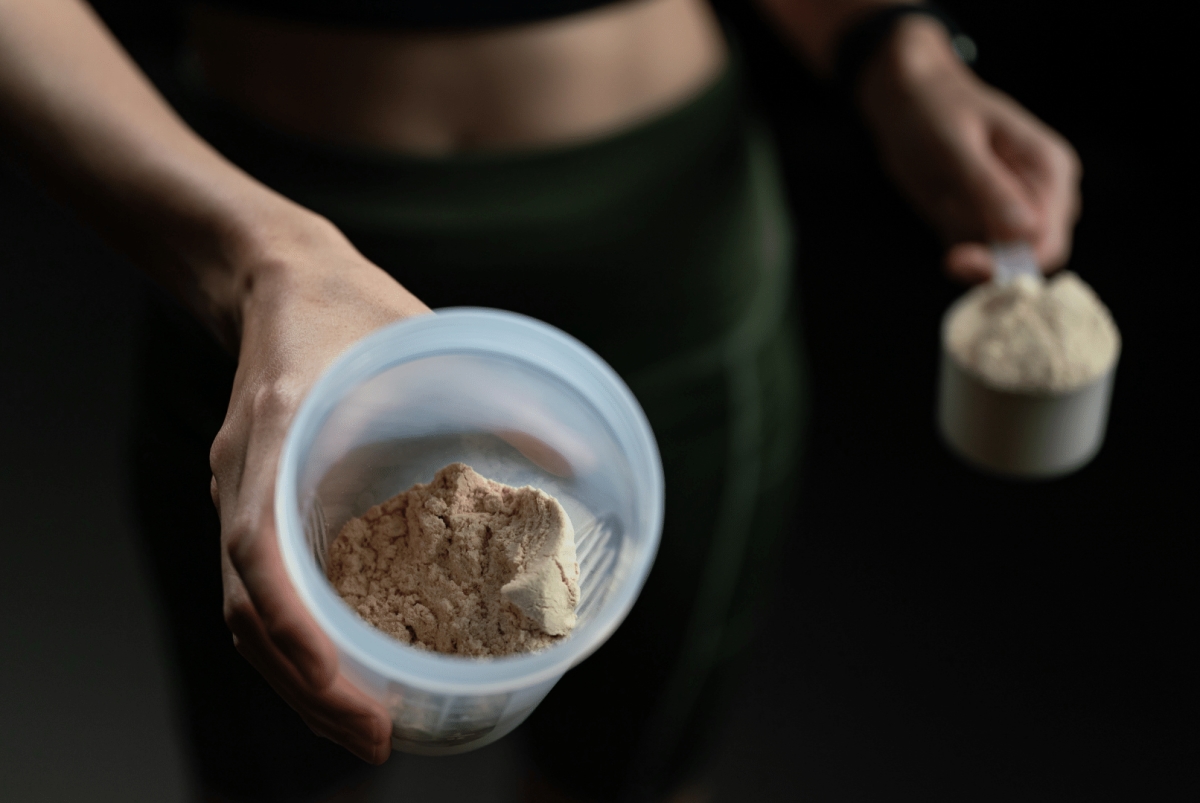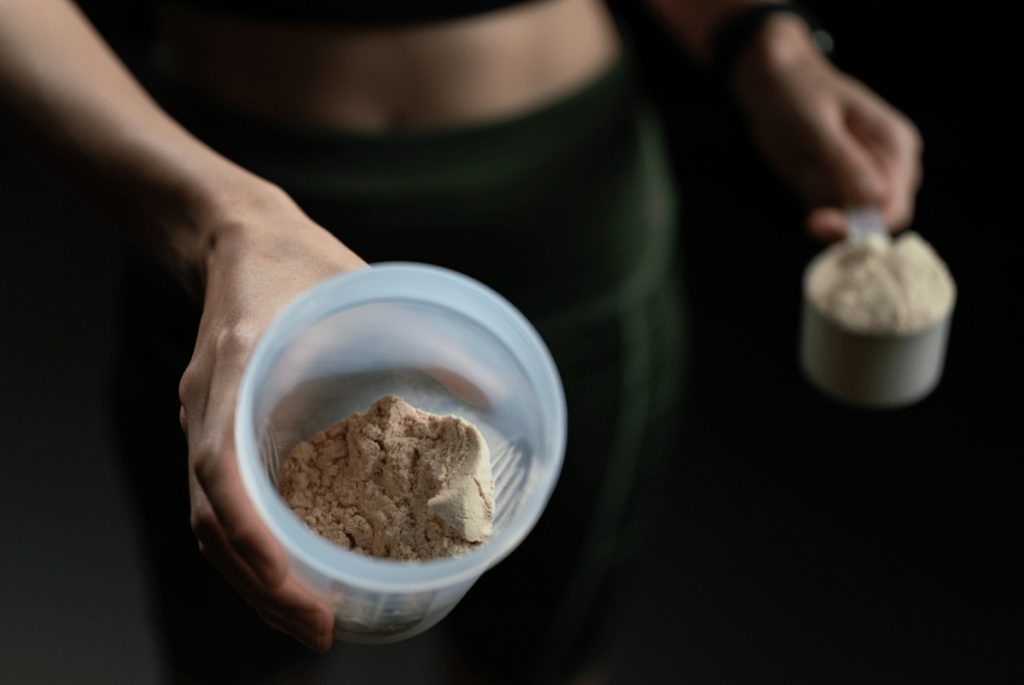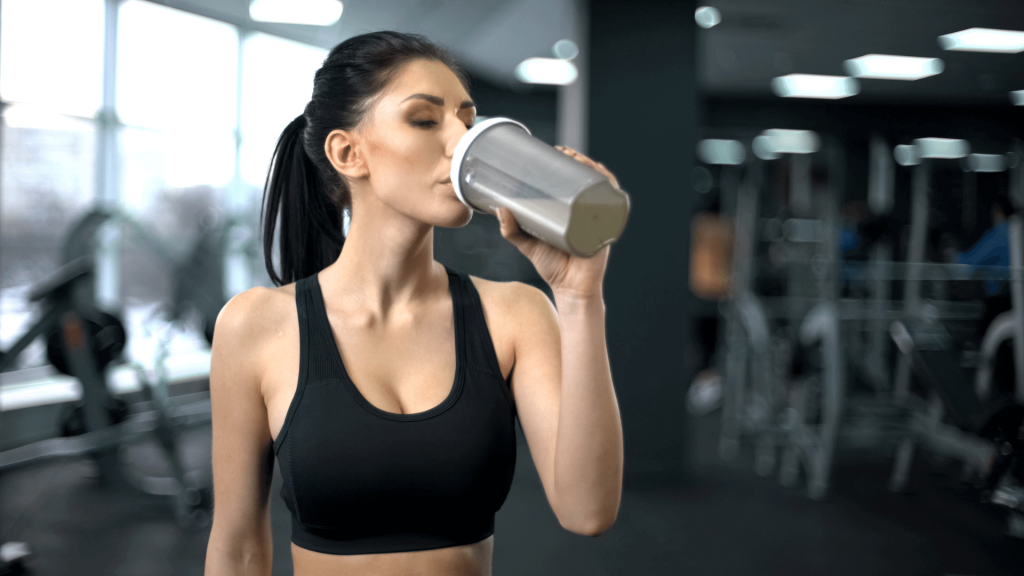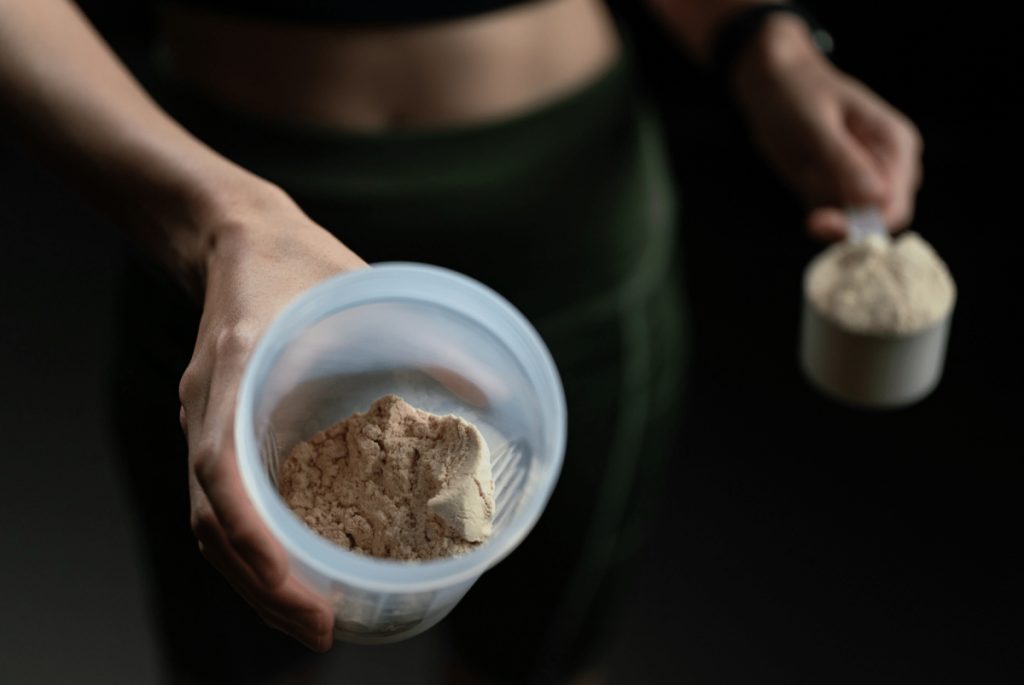
Part 2: Protein Shakes for Muscle Gain: Science, Timing, Comparison, and More


Part 2: Protein Shakes for Muscle Gain: Science, Timing, Comparison, and More
To gain weight, being in a calorie surplus is essential. When specifically looking to put on muscle, you just need to eat more protein to provide building blocks for your body.
Your body optimizes muscle synthesis when you have a steady supply of protein throughout the day, as opposed to getting all of it from one or two meals. The total amount you consume in a 24-hour period is more important than the frequency. However, sharing it across multiple meals and activating mTOR more times may provide better results.
mTOR is a protein that regulates muscle protein synthesis, cell growth, and metabolism. It is important for increasing muscle size. Nutrient availability, amino acids (especially leucine), caloric surplus, and insulin-like growth factor 1 (IGF-1) can activate mTOR.
Each dose of protein you eat throughout the day should activate mTOR, signaling for muscle building. Much of the timing principles in post-workout nutrition relate to mTOR.

Pre and Post Workout
Consuming protein before exercise can help provide your muscles with readily available amino acids to support muscle synthesis and enhance muscle recovery.
Post-exercise protein also has benefits. After a workout, your muscles are primed to absorb and replenish nutrients. This is often termed the “anabolic window”.
This window was thought to last 30 minutes-2 hours post-exercise. However, more recent studies suggest that this window may be larger, with protein synthesis remaining high even several hours after exercise. This means that nutrient intake during this extended period can still support muscle recovery and growth.
It is more important to consume enough protein throughout the entire course of the day for muscle gain than to focus only on post-workout nutrition. Using a protein shake can be helpful to ensure you meet your goals and as long as the protein you are getting is complete, your results should be similar no matter the protein type.
Protein Shake Throughout the Day
As mentioned above, having protein between meals can help ensure your body has a steady supply of amino acids to promote muscle synthesis and prevent muscle breakdown. Shakes are especially useful if you tend to have large gaps in between meals or struggle to reach your protein targets through whole foods alone.
Getting protein at various times of the day can make it easier to activate mTOR. mTOR is sensitive to exercise, insulin levels, total calories, and importantly, amino acid intake from protein. The amino acid leucine is especially responsive to mTOR, and getting in 2-3 grams in combination with enough protein can activate mTOR and promote muscle protein synthesis.
Different types of protein have varying amounts of leucine and other amino acids that can activate mTOR:
| Protein type | % Leucine | Amount per 20 g serving |
| Whey | 13.6% | 2.72 g |
| Casein | 10.2% | 2.04 g |
| Pea | 7.6% | 1.56 g |
| Hemp | 6.9% | 1.38 g |
| Chicken breast | 12.23% | 2.4 g |
| Beef | 8% | 1.6 g |
| Egg | 9% | 1.8 g |
By combining protein sources, you can ensure you are reaching your leucine targets. Plus, by consuming leucine-containing proteins at regular intervals throughout the day, you can be sure that you are optimizing protein synthesis and mTOR activation.
Keep in mind that while leucine can activate mTOR and muscle protein synthesis, you still also need all the 20 amino acids to build muscles. Therefore, it’s best to eat a diverse range of protein foods throughout the day. If you rely on plant-based protein sources, be sure to complement them to get complete proteins.

Protein Shake Before Bed
There are pros and cons to consuming protein before bed. However, if you are looking to gain muscle mass, they may be a good tool.
Having protein before bed can help provide a sustained release of amino acids during the overnight fast. This can help prevent muscle breakdown and support muscle repair and growth overnight. This effect may be even greater when consuming slow-digesting proteins, as they can release amino acids gradually overnight. It may also be even more beneficial if you exercise in the evenings.
If you struggle to reach your protein targets, an evening protein shake may help you bump up your intake, without having to consume a heavy meal right before bed. It may also boost metabolism the next day.
Some people may find that having protein too close to bedtime causes digestive discomfort, which can impact sleep quality. How you respond can depend on your unique metabolism, training status, and overall nutrient intake. The best way to find out is to track your sleep quality with tools like the Oura ring. If your sleep quality drops with pre-bed protein intake, then it’s best to avoid the protein before bed.
How to Boost Muscle Gain Results
- Pair protein with carbohydrates
Pairing protein with carbohydrates can be helpful when looking to gain muscle through these following mechanisms:
- Insulin secretion: Carbohydrates stimulate insulin release from the pancreas, which helps with nutrient uptake and storage. This process can be further stimulated by the addition of protein.
- Amino acid uptake: Insulin helps cells take up amino acids, so pairing protein with carbohydrates can help facilitate amino acids directly into muscle cells. This provides greater availability of amino acids for muscle protein synthesis.
- Muscle glycogen stores: Muscle glycogen stores become depleted during exercise. Consuming carbs with protein post-exercise can help replenish them more effectively and promote muscle recovery for later exercise bouts.
- Anabolic hormone release: In addition to regulating blood sugar, insulin has anabolic effects that promote muscle protein synthesis. Higher insulin levels help release insulin-like growth factor 1 (IGF-1), supporting muscle growth and repair.
- Add digestive enzymes
Another strategy that can be helpful for promoting protein uptake is pairing it with digestive enzymes. Proteases are the digestive enzymes responsible for breaking down proteins to allow them to be adequately absorbed. Your body naturally contains these enzymes, but in some people, they may not always function optimally.
Whey and casein are naturally rich in proteases. Some plant-based protein shakes, including Protein Breakthrough, include these compounds, which can help with protein digestion and increase amino acid absorption.
Choosing a Protein for Muscle Building

When choosing a protein shake for muscle gain, trying different types and seeing how your body responds can be helpful. However, some protein shakes may cause constipation, so look for clean ingredients and a formula that’s easy on digestion. Ideally, look for clean ingredients and a taste you enjoy so that you can reach your protein targets.
Whey vs plant protein for muscle gain
An important thing to understand about dairy proteins, especially whey, is that they can spike insulin. As a result, some people may find themselves hungrier shortly after a serving of whey protein. If you’re trying to eat in a caloric surplus, this might be beneficial.
This insulin spike can also be beneficial for replenishing muscle glycogen stores and bringing amino acids into muscles following a tough workout. Because insulin helps to bring glucose back into the muscle, pairing it with carbohydrates can help you to recover and get ready for your next bout of exercise.
When you should avoid dairy products
Some people may experience gas or inflammatory symptoms like increased mucus with dairy-based protein products. Acne is also a very common problem among bodybuilders, particularly because both dairy and weightlifting can increase IGF-1. If you develop skin problems from dairy-rich food, it may also be causing inflammation throughout your body, including your gut.
Gut inflammation can cause fat gain in some people, but also makes it harder to gain muscles. So, it’s best to avoid foods that cause inflammation in your body. If you’re getting inflammation from dairy, plant-based protein options may be better for you. You can still spike muscle-building insulin by pairing it with carbohydrates, such as bananas, dates, fruits, starchy vegetables, or plain dextrose.
Key Takeaways
Getting enough protein is critical for building muscle mass and strength. By keeping protein intake steady throughout the day, you can help ensure you maintain your amino acid pool and maximize muscle gain. While there are many different products on the market, finding one you enjoy is very important. While whey and casein are both good options, plant-based products offer the same effects and often with fewer inflammatory side effects.
Protein Breakthrough is a plant-based, vegan, and gluten-free protein product, with a complete amino acid profile. It’s formulated with pure and high-quality ingredients that don’t tend to create inflammation.
References
- McNurlan MA, Essen P, Milne E, Vinnars E, Garlick PJ, Wernerman J. Temporal responses of protein synthesis in human skeletal muscle to feeding. Br J Nutr. 1993;69(1):117-126. doi:10.1079/bjn19930014
- Stokes T, Hector AJ, Morton RW, McGlory C, Phillips SM. Recent perspectives regarding the role of dietary protein for the promotion of muscle hypertrophy with resistance exercise training. Nutrients. 2018;10(2). doi:10.3390/nu10020180
- Wang X, Proud CG. The mTOR pathway in the control of protein synthesis. Physiology (Bethesda). 2006;21(5):362-369. doi:10.1152/physiol.00024.2006
- You JS, McNally RM, Jacobs BL, et al. The role of raptor in the mechanical load-induced regulation of mTOR signaling, protein synthesis, and skeletal muscle hypertrophy. FASEB J. 2019;33(3):4021-4034. doi:10.1096/fj.201801653RR
- Saxton RA, Sabatini DM. MTOR signaling in growth, metabolism, and disease. Cell. 2017;168(6):960-976. doi:10.1016/j.cell.2017.02.004
- Schoenfeld BJ, Aragon A, Wilborn C, Urbina SL, Hayward SE, Krieger J. Pre- versus post-exercise protein intake has similar effects on muscular adaptations. PeerJ. 2017;5(e2825):e2825. doi:10.7717/peerj.2825
- Beelen M, Tieland M, Gijsen AP, et al. Coingestion of carbohydrate and protein hydrolysate stimulates muscle protein synthesis during exercise in young men, with no further increase during subsequent overnight recovery. J Nutr. 2008;138(11):2198-2204. doi:10.3945/jn.108.092924
- Børsheim E, Tipton KD, Wolf SE, Wolfe RR. Essential amino acids and muscle protein recovery from resistance exercise. Am J Physiol Endocrinol Metab. 2002;283(4):E648-57. doi:10.1152/ajpendo.00466.2001
- Schoenfeld BJ, Aragon AA. Is there a postworkout anabolic window of opportunity for nutrient consumption? Clearing up controversies. J Orthop Sports Phys Ther. 2018;48(12):911-914. doi:10.2519/jospt.2018.0615
- Messina M, Lynch H, Dickinson JM, Reed KE. No difference between the effects of supplementing with soy protein versus animal protein on gains in muscle mass and strength in response to resistance exercise. Int J Sport Nutr Exerc Metab. 2018;28(6):1-36. doi:10.1123/ijsnem.2018-0071
- Drummond MJ, Rasmussen BB. Leucine-enriched nutrients and the regulation of mammalian target of rapamycin signalling and human skeletal muscle protein synthesis. Curr Opin Clin Nutr Metab Care. 2008;11(3):222-226. doi:10.1097/MCO.0b013e3282fa17fb
- van Vliet S, Burd NA, van Loon LJC. The skeletal muscle anabolic response to plant- versus animal-based protein consumption. J Nutr. 2015;145(9):1981-1991. doi:10.3945/jn.114.204305
- Rondanelli M, Nichetti M, Peroni G, et al. Where to find leucine in food and how to feed elderly with sarcopenia in order to counteract loss of muscle mass: Practical advice. Front Nutr. 2020;7:622391. doi:10.3389/fnut.2020.622391
- Res PT, Groen B, Pennings B, et al. Protein ingestion before sleep improves postexercise overnight recovery. Med Sci Sports Exerc. 2012;44(8):1560-1569. doi:10.1249/MSS.0b013e31824cc363
- Snijders T, Res PT, Smeets JSJ, et al. Protein ingestion before sleep increases muscle mass and strength gains during prolonged resistance-type exercise training in healthy young men. J Nutr. 2015;145(6):1178-1184. doi:10.3945/jn.114.208371
- Holwerda AM, Kouw IWK, Trommelen J, et al. Physical activity performed in the evening increases the overnight muscle protein synthetic response to presleep protein ingestion in older men. J Nutr. 2016;146(7):1307-1314. doi:10.3945/jn.116.230086
- Trommelen J, Holwerda AM, Kouw IWK, et al. Resistance exercise augments postprandial overnight muscle protein synthesis rates. Med Sci Sports Exerc. 2016;48(12):2517-2525. doi:10.1249/MSS.0000000000001045
- Madzima TA, Panton LB, Fretti SK, Kinsey AW, Ormsbee MJ. Night-time consumption of protein or carbohydrate results in increased morning resting energy expenditure in active college-aged men. Br J Nutr. 2014;111(1):71-77. doi:10.1017/S000711451300192X
- van Loon LJ, Saris WH, Kruijshoop M, Wagenmakers AJ. Maximizing postexercise muscle glycogen synthesis: carbohydrate supplementation and the application of amino acid or protein hydrolysate mixtures. Am J Clin Nutr. 2000;72(1):106-111. doi:10.1093/ajcn/72.1.106
- Ivy JL, Kuo CH. Regulation of GLUT4 protein and glycogen synthase during muscle glycogen synthesis after exercise: GLUT4 and muscle glycogen synthesis. Acta Physiol Scand. 1998;162(3):295-304. doi:10.1046/j.1365-201X.1998.0302e.x
- Borsheim E, Aarsland A, Wolfe RR. Effect of an amino acid, protein, and carbohydrate mixture on net muscle protein balance after resistance exercise. Int J Sport Nutr Exerc Metab. 2004;14(3):255-271. doi:10.1123/ijsnem.14.3.255
- Margolis LM, Allen JT, Hatch-McChesney A, Pasiakos SM. Coingestion of carbohydrate and protein on muscle glycogen synthesis after exercise: A meta-analysis: A meta-analysis. Med Sci Sports Exerc. 2021;53(2):384-393. doi:10.1249/MSS.0000000000002476
- Zawadzki KM, Yaspelkis BB 3rd, Ivy JL. Carbohydrate-protein complex increases the rate of muscle glycogen storage after exercise. J Appl Physiol. 1992;72(5):1854-1859. doi:10.1152/jappl.1992.72.5.1854
- Chandler RM, Byrne HK, Patterson JG, Ivy JL. Dietary supplements affect the anabolic hormones after weight-training exercise. J Appl Physiol. 1994;76(2):839-845. doi:10.1152/jappl.1994.76.2.839
- Salehi A, Gunnerud U, Muhammed SJ, et al. The insulinogenic effect of whey protein is partially mediated by a direct effect of amino acids and GIP on β-cells. Nutr Metab (Lond). 2012;9(1):48. doi:10.1186/1743-7075-9-48
- Simonart T. Acne and whey protein supplementation among bodybuilders. Dermatology. 2012;225(3):256-258. doi:10.1159/000345102
- What your skin can tell you about your overall health. Aad.org. Accessed June 10, 2023. https://www.aad.org/public/diseases/a-z/skin-overall-health
